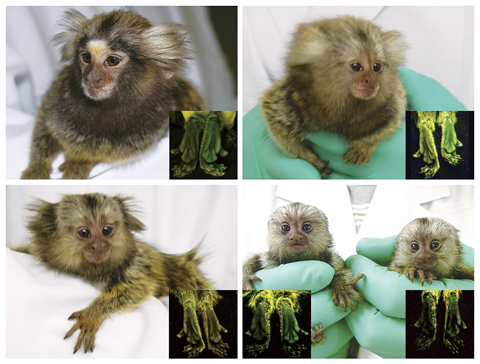They sound more like a Victorian freak show than science, but researchers say that glow-in-the dark monkeys created in a Japanese lab could be a breakthrough in treating human inherited diseases.
The monkeys were given a gene from a jellyfish and, significantly, it was inherited by their young — the first time a genetically modified animal has passed such genes down a generation. Researchers said it was major step towards understanding Parkinson’s and motor neurone disease.
Animal rights groups fear it could mean more primates are used in research labs. It also raises the possibility of genetically modifying humans, although such work is illegal in Britain and in most countries.

PHOTO: REUTERS
Erika Sasaki and her team at the Central Institute for Experimental Animals in Kawasaki, Japan, added a gene to marmoset embryos that made them glow green under ultraviolet light. The embryos were transferred into surrogate females, and produced five live births.
All carried the green gene somewhere in their bodies, and two passed it to offspring. Last month, a male was born using sperm from one monkey called Kou, and two more glowing marmosets have been born since. One died after being bitten by its mother. All are healthy, and do not glow under normal lighting.
The scientists plan to create families of monkeys that develop neuro-degenerative diseases.
“Our method promises to be a powerful tool for studying the mechanisms of human diseases and developing new therapies,” they wrote in the journal Nature.
But an accompanying editorial warns it “promises to raise the stakes” over animal rights by “intentionally introducing a harmful gene into the primate gene pool.”
Genetically modified mice are often used to learn about human diseases, but in some cases primates will be more informative.
“This is potentially very exciting,” said Kieran Breen of the Parkinson’s Disease Society. “Because primates are much closer to humans than mice, we’ll have a new animal model to work with.”
Aside from whether the technique can indeed recreate human-type diseases, a European directive may prohibit use of primates in such research. Vicky Robinson, of NC3Rs, which campaigns to reduce use of animals, said: “We can’t assume a transgenic marmoset will be better for disease research than, for example, a transgenic mouse. Any researcher will need to show the added scientific value of using a monkey outweighs the significant ethical considerations accompanying its use.”

POLITICAL PRISONERS VS DEPORTEES: Venezuela’s prosecutor’s office slammed the call by El Salvador’s leader, accusing him of crimes against humanity Salvadoran President Nayib Bukele on Sunday proposed carrying out a prisoner swap with Venezuela, suggesting he would exchange Venezuelan deportees from the US his government has kept imprisoned for what he called “political prisoners” in Venezuela. In a post on X, directed at Venezuelan President Nicolas Maduro, Bukele listed off a number of family members of high-level opposition figures in Venezuela, journalists and activists detained during the South American government’s electoral crackdown last year. “The only reason they are imprisoned is for having opposed you and your electoral fraud,” he wrote to Maduro. “However, I want to propose a humanitarian agreement that

ECONOMIC WORRIES: The ruling PAP faces voters amid concerns that the city-state faces the possibility of a recession and job losses amid Washington’s tariffs Singapore yesterday finalized contestants for its general election on Saturday next week, with the ruling People’s Action Party (PAP) fielding 32 new candidates in the biggest refresh of the party that has ruled the city-state since independence in 1965. The move follows a pledge by Singaporean Prime Minister Lawrence Wong (黃循財), who took office last year and assumed the PAP leadership, to “bring in new blood, new ideas and new energy” to steer the country of 6 million people. His latest shake-up beats that of predecessors Lee Hsien Loong (李顯龍) and Goh Chok Tong (吳作棟), who replaced 24 and 11 politicians respectively

Young women standing idly around a park in Tokyo’s west suggest that a giant statue of Godzilla is not the only attraction for a record number of foreign tourists. Their faces lit by the cold glow of their phones, the women lining Okubo Park are evidence that sex tourism has developed as a dark flipside to the bustling Kabukicho nightlife district. Increasing numbers of foreign men are flocking to the area after seeing videos on social media. One of the women said that the area near Kabukicho, where Godzilla rumbles and belches smoke atop a cinema, has become a “real

‘WATER WARFARE’: A Pakistani official called India’s suspension of a 65-year-old treaty on the sharing of waters from the Indus River ‘a cowardly, illegal move’ Pakistan yesterday canceled visas for Indian nationals, closed its airspace for all Indian-owned or operated airlines, and suspended all trade with India, including to and from any third country. The retaliatory measures follow India’s decision to suspend visas for Pakistani nationals in the aftermath of a deadly attack by shooters in Kashmir that killed 26 people, mostly tourists. The rare attack on civilians shocked and outraged India and prompted calls for action against their country’s archenemy, Pakistan. New Delhi did not publicly produce evidence connecting the attack to its neighbor, but said it had “cross-border” links to Pakistan. Pakistan denied any connection to